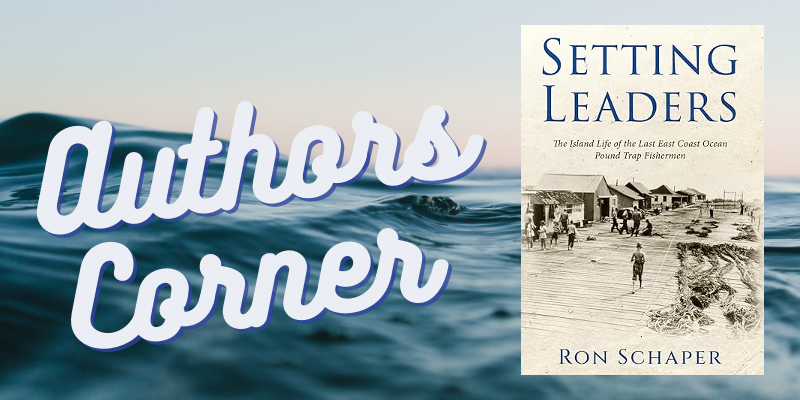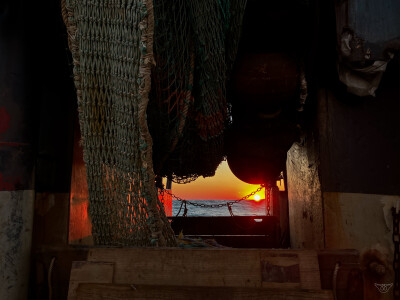Intended to be more than a fishing memoir, Ron Schaper’s new book, Setting Leaders, explores the beauty and challenges of a life lived on the water from the perspective that only a son of a fisherman can provide. The Schaper family operated the Sunrise Fish Company on the south shore of Long Island, NY, and its offshore pound traps for generations. This is a memoir that reflects on growing up in that fishing industry.
We caught up with Schaper to get a better sense of how the memoir celebrates a way of life that has been passed down through generations, as well as how some of the lessons learned from the sea can be applied in larger ways. Designed to resonate with anyone interested in a simple family life focused on earning their livelihood from the sea, the memoir connects experiences and eras in a way that few others have been able to accomplish.
National Fisherman: What was one of the driving factors or forces behind your desire to embark on the journey through time that defines Setting Leaders?
Ron Schaper: I feel it is important to document a now gone fishery that supported numerous generations. The island fish camp was a magical place for kids to learn about boats, fishing and a simpler old-style life without the comforts and distractions of the mainland. There, instead of riding your bike to go visit a friend, you sailed a boat to the next island.
That’s a good example of the simpler times your memoir details, but what are some of the most notable ways that the industry is now so much more complicated? Is that ultimately related to regulations, or changing consumer behaviors, or something else?
My family was operating the pound traps well before large factory trawlers and foreign fleets necessitated strict fisheries regulations and quotas. Though there were some negative comments from the sport fishers that the pound traps were “catching all the fish,” many of the fish in traps were species that the sporties didn’t want, like sea robins (used in fish meal), dogfish, herring, whiting, mackerel and bunkers. Pound trap fish were always prized in the market because they were caught live that day, as opposed to trawler caught fish which may have been dragged and drowned, then on ice for a week before being brought ashore. Which would you rather eat: a fish caught today or one that drowned a week ago?
Pound traps are stationary and rely on the seasonal movements of fish. Modern trawlers and longliners target specific species in wide areas of the ocean.
What about how you've documented and detailed things like the thrill of the catch do you believe will resonate with anyone who has a fishing background?
Anyone who has reeled in or gaffed a respectably sized fish can appreciate what it is like to gaff a swimming 1200-pound tuna from an 18-foot boat. Imagine working from one of these sharpies trying to control a 35-foot 8-ton whale shark. It can be a shocking experience to wade thigh deep through a swinging deck-load of fish only to get jolted by an electric ray buried under the catch.
Your focus on a life and profession that has been passed down through the generations is one that many fishermen will appreciate, but what makes these sorts of connections across the eras so essential to and for the fishing industry as a whole?
Growing up in this fishing family brought a closeness, especially with my uncles, that many folks do not have. Sitting on my uncle’s island beach house porch in the evening as he puffed on his pipe, regaling young kids with sea stories, then sailing with him and my dad the next day to make our own stories.
The complexity of setting up and maintaining the pound traps had to be taught…there was no manual. When the old fishermen, including my dad and uncles, could no longer fish, their children and cousins sought easier ways to make a living so the pound trap fishery ended. While it was the end of an era, their lore lives on as the children and grandchildren now cherish the old beach houses and the simpler island lifestyle.
Would you say this book is more about individual people, the commercial fishing industry as a whole or something else?
Ocean pound traps were effective but extremely capital intensive and required enormous amounts of strenuous labor by dedicated family and their crew so it is about both the fishery and the men who made it work. Operating pound traps required a small fleet of specialized boats and experienced strong fishermen.
What's one thing you'd tell a commercial fisherman about the reason they should have a copy of your book on their boat?
Pound trap fishermen never knew what would be in their nets the next day. One day it was a 35-foot 8-ton whale shark, another day a bunch of giant tuna. Fishermen always look forward to what will they catch next. This story will whet their anticipation.
Click here to learn more or purchase Setting Leaders







